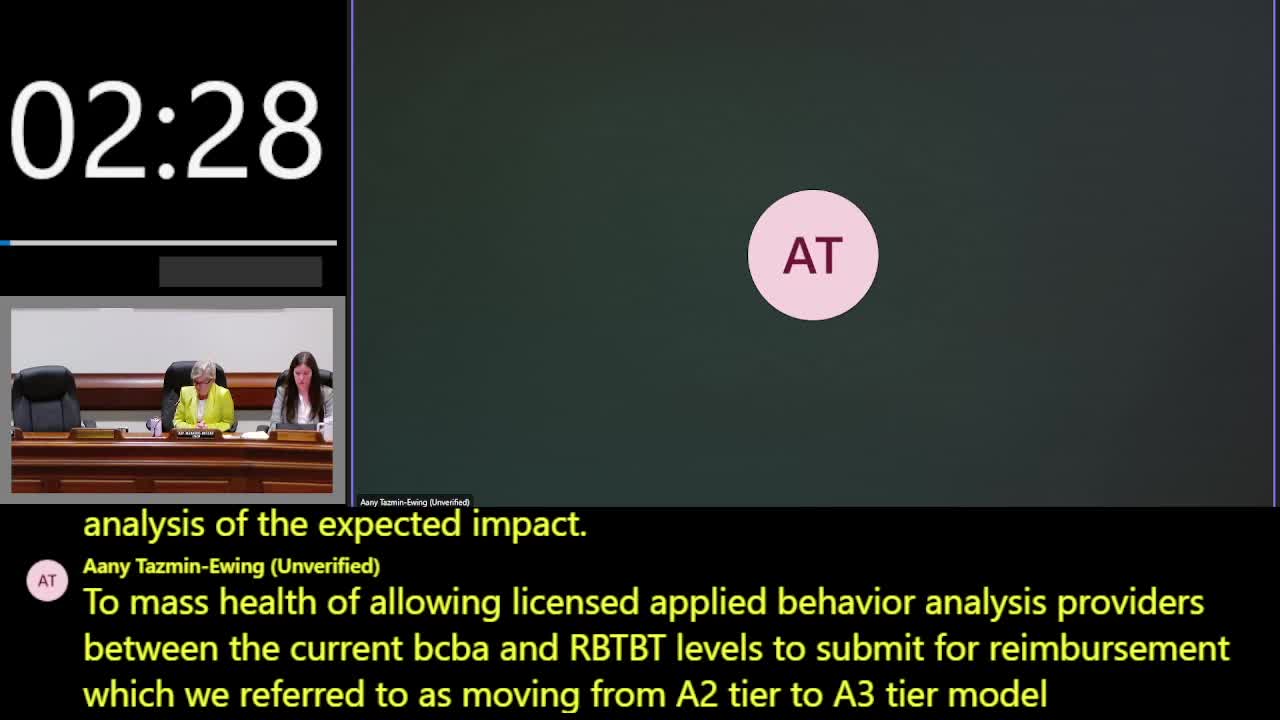Massachusetts Actuarial Report Claims 6% Savings from 3 Tier Service Delivery Model
September 29, 2025 | 2025 Legislature MA, Massachusetts
This article was created by AI summarizing key points discussed. AI makes mistakes, so for full details and context, please refer to the video of the full meeting. Please report any errors so we can fix them. Report an error »

A new actuarial analysis presented at the Joint Committee on Public Health meeting reveals that transitioning to a three-tier service delivery model for behavioral health could save Massachusetts up to $11.5 million annually. This significant reduction in costs, estimated at 6% per child served, stems from a review of claims data from Massachusetts and California.
The analysis highlights that Massachusetts currently provides an average of 6.5 hours of BCBA (Board Certified Behavior Analyst) treatment per month, compared to just 0.9 hours in California. As children age, the treatment hours in Massachusetts increase dramatically, from 1 hour for toddlers to 9 hours for youth and young adults. In contrast, California's model maintains low BCBA hours across all ages, relying more on mid-tier providers.
The proposed shift in Massachusetts aims to redistribute service delivery from BCBAs to these mid-tier providers, who would be compensated at a lower rate, potentially decreasing costs by 8% per hour. This model not only promises financial savings but also aims to improve access to care for children currently facing long wait times.
While the analysis suggests that the three-tier model could maintain or enhance the quality of care, it also notes that actual results may vary. The full actuarial report will provide further details on the methodology and findings. The committee expressed gratitude for the insights shared and opened the floor for questions, indicating a strong interest in the potential impacts of this proposed change.
The analysis highlights that Massachusetts currently provides an average of 6.5 hours of BCBA (Board Certified Behavior Analyst) treatment per month, compared to just 0.9 hours in California. As children age, the treatment hours in Massachusetts increase dramatically, from 1 hour for toddlers to 9 hours for youth and young adults. In contrast, California's model maintains low BCBA hours across all ages, relying more on mid-tier providers.
The proposed shift in Massachusetts aims to redistribute service delivery from BCBAs to these mid-tier providers, who would be compensated at a lower rate, potentially decreasing costs by 8% per hour. This model not only promises financial savings but also aims to improve access to care for children currently facing long wait times.
While the analysis suggests that the three-tier model could maintain or enhance the quality of care, it also notes that actual results may vary. The full actuarial report will provide further details on the methodology and findings. The committee expressed gratitude for the insights shared and opened the floor for questions, indicating a strong interest in the potential impacts of this proposed change.
View full meeting
This article is based on a recent meeting—watch the full video and explore the complete transcript for deeper insights into the discussion.
View full meeting
